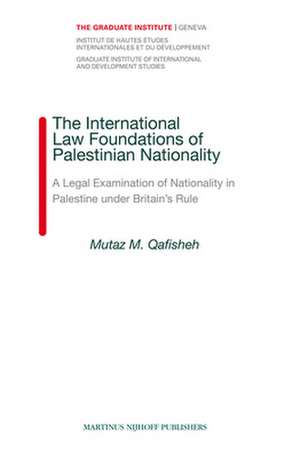The International Law Foundations of Palestinian Nationality: A Legal Examination of Nationality in Palestine under Britain’s Rule: Graduate Institute of International and Development Studies, cartea 7
Autor Mutaz Qafishehen Limba Engleză Hardback – 16 sep 2008
This work provides a legal basis for future settlement of the status of Palestinians of all categories that emerged in some sixty years following the end of the Palestine Mandate: Israeli citizens, inhabitants of the occupied territory, and Palestinian refugees. In conclusion, nationality as regulated by Britain in Palestine represents an international status that cannot be legally altered except in accordance with international law.
Preț: 721.37 lei
Preț vechi: 879.72 lei
-18% Nou
Puncte Express: 1082
Preț estimativ în valută:
138.04€ • 144.48$ • 114.89£
138.04€ • 144.48$ • 114.89£
Carte indisponibilă temporar
Doresc să fiu notificat când acest titlu va fi disponibil:
Se trimite...
Preluare comenzi: 021 569.72.76
Specificații
ISBN-13: 9789004169845
ISBN-10: 9004169849
Pagini: 252
Dimensiuni: 160 x 240 x 20 mm
Greutate: 0.59 kg
Editura: Brill
Colecția Brill | Nijhoff
Seria Graduate Institute of International and Development Studies
ISBN-10: 9004169849
Pagini: 252
Dimensiuni: 160 x 240 x 20 mm
Greutate: 0.59 kg
Editura: Brill
Colecția Brill | Nijhoff
Seria Graduate Institute of International and Development Studies
Cuprins
Preface
Foreword
I Introduction
II Nationality in Palestine under the Ottoman Empire
III Palestinian nationality in transition, 1917–1925
IV Palestinian Citizenship Order 1925
V Natural Palestinian citizens
VI Naturalization
VII Expatriation: loss of nationality
VIII External aspects of Palestinian nationality
IX Admission of foreigners into Palestine
X Applicability of international nationality instruments to Palestine
XI Palestinian nationality in the Partition Plan
XII Conclusion
Bibliography
Index
Foreword
I Introduction
II Nationality in Palestine under the Ottoman Empire
III Palestinian nationality in transition, 1917–1925
IV Palestinian Citizenship Order 1925
V Natural Palestinian citizens
VI Naturalization
VII Expatriation: loss of nationality
VIII External aspects of Palestinian nationality
IX Admission of foreigners into Palestine
X Applicability of international nationality instruments to Palestine
XI Palestinian nationality in the Partition Plan
XII Conclusion
Bibliography
Index
Notă biografică
Mutaz M. Qafisheh, a Palestinian-French lawyer, holds a Ph.D. degree (2007) in international law, with distinction, from the Graduate Institute of International Studies, Geneva. He teaches at the Faculty of Law, Al-Quds University, Jerusalem, and manages an international program to enhance legal education of Palestinian law schools. Until recently (2001–2008) he worked as a Human Rights Officer at the United Nations Office of the High Commissioner for Human Rights in Ramallah, Geneva and Beirut. He was previously employed as Director of a project on Palestinian Security Sector Reform, as a Legal Advisor for the Palestinian Parliament and as a Legal Researcher at Birzeit University, Palestine. His academic specialization includes human rights, refugee law, humanitarian law, private international law, Palestinian and Middle East law.
Recenzii
“Indeed, uncertainty regarding the precise status of Palestinians today affects their protection and rights, both in the Middle East and in the many countries throughout the world in which Palestinians have settled or sought refuge…. The organization of the thesis and its overall presentation are clear… in fact, it is a pleasure to read…. Mr. Qafisheh is to be highly commanded for the thoroughness and depth of his research, and for bringing into the light of day a chapter of law and practice which has been too little considered.”
Guy S. Goodwin-Gill, All Souls College, Oxford
“This book is extremely well researched, and well written. It deals with an important topic that is not covered in any published book…. With the prospect of a Palestine state emerging, the issue of Palestinian nationality becomes quite current…. As the author rightly points out, a Palestine state cannot determine to whom its nationality should extend without considering who was a national of Palestine in the mandate era. This book can serve as a handbook for drafters of a future Palestine nationality law.”
John Quigley, Ohio State University
“The thesis does project into the future, laying down certain lines of enquiry and future research into questions of nationality in post-mandate Palestine and… is not only of historical value…. I congratulate Mr. Qafisheh for his thesis which I consider to be a valuable contribution to the literature and very well argued and researched. The original documentation relied on and the case-law cited enriches the argumentation. Mr. Qafisheh has thus succeeded in shedding light on many undocumented aspects of this Palestinian era.”
Vera Gowlland, Graduate Institute of International Studies, Geneva
Guy S. Goodwin-Gill, All Souls College, Oxford
“This book is extremely well researched, and well written. It deals with an important topic that is not covered in any published book…. With the prospect of a Palestine state emerging, the issue of Palestinian nationality becomes quite current…. As the author rightly points out, a Palestine state cannot determine to whom its nationality should extend without considering who was a national of Palestine in the mandate era. This book can serve as a handbook for drafters of a future Palestine nationality law.”
John Quigley, Ohio State University
“The thesis does project into the future, laying down certain lines of enquiry and future research into questions of nationality in post-mandate Palestine and… is not only of historical value…. I congratulate Mr. Qafisheh for his thesis which I consider to be a valuable contribution to the literature and very well argued and researched. The original documentation relied on and the case-law cited enriches the argumentation. Mr. Qafisheh has thus succeeded in shedding light on many undocumented aspects of this Palestinian era.”
Vera Gowlland, Graduate Institute of International Studies, Geneva












